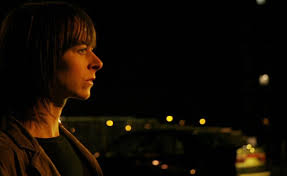Eye For Film >> Movies >> Red Road (2006) Film Review
Red Road
Reviewed by: Angus Wolfe Murray

Jackie (Kate Dickie) watches a bank of screens in what might be a control room on an orbiting satellite. In fact, it's Glasgow, 2006, and she's a CCTV operative, keeping an eye - multiple eyes - on a seedy area of the city amongst the high-rise estates. She is attentive to possible trouble, as she manipulates the street cameras from the safety of her darkened bunker. The mood is tense, because she is tense, and voyeuristic, like Rear Window, as if the intrusive lenses are about to expose a terrible human tragedy.
Jackie's life is a closed book. She wears a wedding ring, but there doesn't seem to be a husband. She indulges, or rather allows herself to be indulged, in front seat van sex with a married colleague, during which few words and no emotions are expressed. If her life is empty, she does not appear to be a hollow woman. The passion, desire and love that once nurtured in her soul has been damaged, perhaps forever. She carries pain like others embrace dull contentment.

Slowly it becomes apparent that she is obsessing about one of the men on the screens. She knows his name and that he has recently come out of prison. She starts behaving like a stalker, at first with the CCTV cameras and then personally, tricking her way into his high rise flat when he is throwing a party. Is her interest sexual? Does she know him from somewhere? Is she in danger? Has she lost her mind?
Writer/director Andrea Arnold's debut feature caused a storm at Cannes (2006) and went on to win the Jury Prize. Certainly well deserved, the film makes no compromises to its audience. Jackie's story unfolds achingly slowly, offering no comfort to mainstream entertainment junkies. It has the courage of its conviction. The language is rough; the sex is explicit; the mood is dark.
At a time when Scorsese's The Departed is praised to the ceiling for its gritty realism, as if the choreography of violence panders to artistic fashion, Red Road has an honesty that is in your face and down your trousers and over your shoes. The poetry of poverty is missing. Instead, there is a tension that never goes away, because there are no stereotypes, no patterns of behaviour, no easy peasy lemon squeasy.
"Life sucks." They say it everywhere, even in rom-coms. "Things happen." Arnold will have none of this - simplistic mind wipes! Her film is bare naked, like an unmade bed, infused with anger and stained from the leakage of a discarded condom.
The performances, too, are natural. Dickie retains a toughness and intensity, shouldering the weight of Jackie's depression. Tony Curran, as the ex-con Clyde, is forthright and surprisingly sensitive, while Martin Compston, the teenage footballer who started his acting career in Ken Loach's Sweet Sixteen (2002), is electrifying as Clyde's emotionally screwed up flatmate.
Glasgow recovered from Lynne Ramsay's despairing, yet elegiac, debut Ratcatcher (1999). Will it recover from this?
Reviewed on: 24 Oct 2006



















